Computer Science and Engineering
INTRODUCTION
The Department of Computer Science and Engineering was established in the year 2001.It offers a 4 year B.E (Computer Science and Engineering) Programme and 2 year M.E. (Computer Science and Engineering) Programme.The department has been recognized as a centre for carrying out Ph.D (By Research) Programme under Anna University, Chennai. It has dedicated and specialized faculty members in different areas of Computer Science and Engineering with rich experience in academics, industry and research. The department has well equipped and spacious laboratories with modern computer equipments.
The vision and mission of the department is
Vision
To produce globally competent, socially responsible professionals in the field of Computer Science and Engineering.
Mission
- M1: Impart high quality experiential learning to get expertise in modern software tools
- M2: Inculcate industry exposure and build inter disciplinary research skills
- M3: Mould the students to become Software Professionals, Researchers and Entrepreneurs by providing advanced laboratories.
- M4: Acquire Innovative skills and promote lifelong learning with a sense of societal and ethical responsibilities
Faculty Name List
| S.NO | NAME | DESIGNATION |
| 1. | Dr.S.NANDHAKUMAR | PROFESSOR |
| 2. | Dr.R.GOPI | PROFESSOR |
| 3. | Dr. Shree K V M | PROFESSOR |
| 4. | Mrs.T.GEETHA | ASSOCIATE PROFESSOR |
| 5. | Mrs.S.R.SOWMIYA | ASSOCIATE PROFESSOR |
| 6. | Mr.V.GOKULAKRISHNANAN | ASSOCIATE PROFESSOR |
| 7. | Mr.G.RAJA | ASSOCIATE PROFESSOR |
| 8. | Mrs.R.AARTHY | ASSOCIATE PROFESSOR |
| 9. | Mr.S.CHINNADURAI | ASSOCIATE PROFESSOR |
| 10. | Mrs.S.FRANCIS SHAMILI | ASSOCIATE PROFESSOR |
| 11. | Mr.A.YUVARAJ | ASSISTANT PROFESSOR |
| 12. | Mrs.B.DEEPIKA | ASSISTANT PROFESSOR |
| 13. | Mr.R.GOVINDASAMY | ASSISTANT PROFESSOR |
| 14. | Ms. SUVIKA | ASSISTANT PROFESSOR |
| 15. | Mrs.K.RAMYA | ASSISTANT PROFESSOR |
| 16. | Mr.G.ARUN | ASSISTANT PROFESSOR |
| 17. | Mr.P.NALLUSAMY | ASSISTANT PROFESSOR |
| 18. | Mr.S.DIVESH | ASSISTANT PROFESSOR |
| 19. | Mrs.P.PARAMESHWARI | ASSISTANT PROFESSOR |
| 20. | Mr.DHAVAMANIYAN | ASSISTANT PROFESSOR |
| 21. | Mrs.KEERTHANASRI | ASSISTANT PROFESSOR |
| 22. | Mrs.LAVANYA | ASSISTANT PROFESSOR |
| 23. | Mrs.M.SOWNDHARYA | ASSISTANT PROFESSOR |
| 24. | Mr.M.SANTHOSH KUMAR | ASSISTANT PROFESSOR |
| 25. | Mr.K.SAMPATH | ASSISTANT PROFESSOR |
| 26. | Mrs.S.RAMYA | ASSISTANT PROFESSOR |
| 27. | Mrs.PREMALATHA | ASSISTANT PROFESSOR |
| 28. | Mrs.SUHASHINI | ASSISTANT PROFESSOR |
| 29. | Mr.BASKAR | ASSISTANT PROFESSOR |
| 30. | Mrs.LOGAVINAYAGASUNDARI | ASSISTANT PROFESSOR |
| 31. | Mrs.GOWRISARANYA | ASSISTANT PROFESSOR |
| 32. | Mrs.Jayapradha .S | ASSISTANT PROFESSOR |
| 33. | R.Archana | ASSISTANT PROFESSOR |
Program Educational Objectives (PEOs)
- PEO 1: Graduates of the programme will develop proficiency in identifying, formulating, and resolving complex computing problems.
- PEO 2: Graduates of the programme will achieve successful careers in the field of computer science and engineering, pursue advanced degrees, or demonstrate entrepreneurial success.
- PEO 3: Graduates of the programme will cultivate effective communication skills, teamwork abilities, ethical values, and leadership qualities for professional engagement in industry and research organizations.
PROGRAMME SPECIFIC OUTCOMES (PSO):
Graduates of B.E. Computer Science and Engineering will be able to:
- PSO 1: Analyze, develop and provide solutions to industrial problems in computer domain using programming, data processing and analytical skills.
- PSO 2: Apply software application oriented skills to innovate solution to meet the ever changing demands of IT industry.
Program Outcomes (POs):
- PO1: Engineering knowledge: Apply the knowledge of mathematics, science, engineering fundamentals, and an engineering specialization to the solution of complex engineering problems.
- PO2: Problem analysis: Identify, formulate, review research literature, and analyze complex engineering problems reaching substantiated conclusions using first principles of mathematics, natural sciences, and engineering sciences.
- PO3: Design / development of solutions: Design solutions for complex engineering problems and design system components or processes that meet the specified needs with appropriate consideration for the public health and safety, and the cultural, societal, and environmental considerations.
- PO4: Conduct investigations of complex problems: Use research based knowledge and research methods including design of experiments, analysis and interpretation of data, and synthesis of the information to provide valid conclusions.
- PO5: Modern tool usage: Create, select, and apply appropriate techniques, resources, and modern engineering and IT tools including prediction and modeling to complex engineering activities with an understanding of the limitations.
- PO6: The engineer and society: Apply reasoning informed by the contextual knowledge to assess societal, health, safety, legal and cultural issues and the consequent responsibilities relevant to the professional engineering practice.
- PO7: Environment and sustainability: Understand the impact of the professional engineering solutions in societal and environmental contexts, and demonstrate the knowledge of, and need for sustainable development.
- PO8: Ethics: Apply ethical principles and commit to professional ethics and responsibilities and norms of the engineering practice.
- PO9: Individual and team work: Function effectively as an individual, and as a member or leader in diverse teams, and in multidisciplinary settings.
- PO10: Communication: Communicate effectively on complex engineering activities with the engineering community and with society at large, such as being able to comprehend and write effective reports and design documentation, make effective presentations, and give and receive clear instructions.
- PO11: Project management and finance: Demonstrate knowledge and understanding of the engineering and management principles and apply these to one’s own work, as a member and leader in a team, to manage projects and in multidisciplinary environments.
- PO12: Life - long learning: Recognize the need for and have the preparation and ability to engage in independent and life-long learning in the broadest context of technological change.
Laboratories
COMPUTER LAB – 1
Venue: A 201 (A)
Number of System: 64
LAB UTILIZATION
| ODD SEMESTER | EVEN SEMESTER |
| 1.Data Base Management Systems Laboratory | 1.Computer Networks Laboratory |
| 2.Object oriented Programming Laboratory | 2.Operating System Laboratory |
SYSTEM CONFIGURATION:
- Processor: Intel® Core ™ i5-6500 CPU @ 3.20 GHZ
- RAM: 8.00 GB DDR-4
- SSD: 256 GB
- Keyboard & Optical Mouse
- Monitor: Lenovo 18.5 Inch
- DVD Writer
- Windows 10 Pro OS
SOFTWARE AVAILABLE:
- JDK1.6
- Eclipse
- Turbo C7
- Oracle 9i
- Java version &NS2
- Linux(Fedora19)
TECHNICAL MANPOWER SUPPORT:
Mr Swaminathan K. B.Sc.(CS)., - Programmer
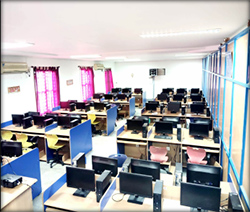
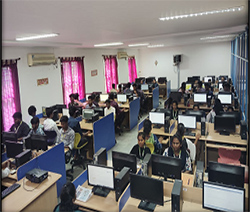
COMPUTER LAB – 2
Venue: A 201 (B)
Number of System: 76
LAB UTILIZATION
| ODD SEMESTER | EVEN SEMESTER |
| 1.Object Oriented Analysis and Design Laboratory | 1. Data Mining Tools Laboratory |
| 2.Internet Programming Laboratory | 2. Security Laboratory |
SYSTEM CONFIGURATION:
- Processor: Intel® Core ™ i5-6500 CPU @ 3.20 GHZ
- RAM: 8.00 GB DDR-4 SSD: 256 GB
- Keyboard & Optical Mouse
- Monitor: Acer 18.5 Inch
- DVD Writer
- Low Volt, Dual Rank, X4 Bandwidth
- Windows 10 Pro OS
SOFTWARE AVAILABLE:
- ARGO UML
- JAVA/HTML/XML
- WEKA TOOL
TECHNICAL MANPOWER SUPPORT:
Mr Silambarasan A. BCA., - Programmer
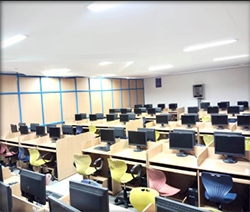
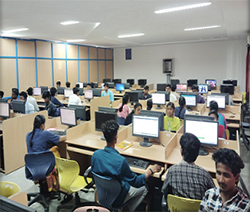
COMPUTER LAB – 3
Venue: A 101 (A)
Number of System: 80
LAB UTILIZATION
| ODD SEMESTER | EVEN SEMESTER |
| 1.MS Power Bi Laboratory | 1.Mobile Network Design Technologies Laboratory |
| 2. Advanced Data Analytics Laboratory |
SYSTEM CONFIGURATION:
- Processor: Intel® Core ™ i3-3220 CPU @ 3.20 GHZ
- RAM: 2.00 GB DDR 3
- HDD: 500 GB
- Keyboard & Optical Mouse
- Monitor: Lenovo 18.5 Inch
- DVD Writer
SOFTWARE AVAILABLE:
- JAVA/HTML/XML
- MS Power bi
TECHNICAL MANPOWER SUPPORT:
Mrs Sathya A. B.E (CSE) - Programmer
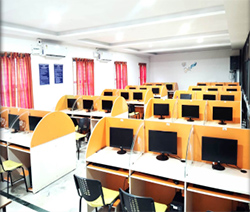
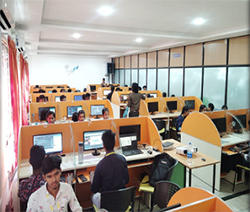
COMPUTER LAB – 4
Venue: A 101 (B)
Number of System: 64
| ODD SEMESTER | EVEN SEMESTER |
| 1.Mini Project | 1.Research /Project work |
| 2.Research /Project work |
SYSTEM CONFIGURATION:
- Processor: Intel® Core ™ i3-6100T Cpu @ 3.20 GHZ
- RAM: 4.00 GB DDR 4
- SSD: 256 GB
- Keyboard & Optical Mouse
- Monitor: Lenovo 18.5 Inch
- DVD Writer
- Windows 10 Pro OS
SOFTWARE AVAILABLE:
- Turbo C/C++
- Fedora 19
- JDK1.6
- Power bi
- Microsoft Visual Studio 2010
- Eclipse
- Apache Tomcat server
- MySql
- Python
- NS2
- R-Studio
- Weka Tool
- Adobe Reader
TECHNICAL MANPOWER SUPPORT:
Mrs Selvarani S. B.E - Programmer
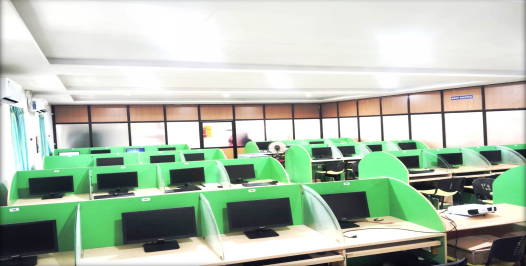
Internet of Things Lab:
Venue: A 105
Number of System: 10
| ODD SEMESTER | EVEN SEMESTER |
| 1.Internet of Things Laboratory | 1.Internet of Things Project work |
SYSTEM CONFIGURATION:
- Processor: Intel® Core ™ i3-6100T Cpu @ 3.20 GHZ
- RAM: 4.00 GB DDR 4
- SSD: 256 GB
- Keyboard & Optical Mouse
- Monitor: Lenovo 18.5 Inch
- Windows 10 Pro OS
OPEN SOURCE SOFTWARE:
- Turbo C++, GCC Compiler
- Codeblocks, Python, Java
- Arduino IDE
- Netbeans, Eclipse
- Anaconda, Jupiter, Wire Shark
- PHP, MY SQL, Network Simulator 2
- R Tool, R Language, R Studio
- Android Studio,Linux OS, Cent OS
TECHNICAL MANPOWER SUPPORT:
Mrs.P.Saritha - Programmer
| S.No | Academic year | Project Title | Funding agency | Duration |
| 1. | 2019 2020 | Automatic medical image diagnoses for Brine Tumor Detection Using AI Technologies | Green Soft Groups | 6 months |
| 2. | 2020 -2021 | Plasma Donor Application | Avera Technology Pvt ltd | 6 months |
| 3. | 2021 2022 | Covid-19 prediction form Chest X-ray and CT scan using Deep Learning Methods | Thrishicaa Softwares | 6 months |
| 4. | 2021 2022 | Vehicle speed control system : jurisdiction in restricted area using deep learning and RF. | Green Soft Groups | 6 months |
| S.No | Timelines | Tasks | Project Person |
| 1 | 40 days | Reviewing literature and Collection of the image data set. | P.Varalakshmi S.Subashini R.Vasuki S.Swathi |
| 2 | 45 days | Developing the image prepossessing. | P.Varalakshmi S.Subashini R.Vasuki S.Swathi |
| 3 | 15 days | Import all library file | P.Varalakshmi S.Subashini R.Vasuki S.Swathi |
| 4 | 50 days | Developing a algorithm and execution of the code. | P.Varalakshmi S.Subashini R.Vasuki S.Swathi |
| 5 | 45 days | Train the data set and then installing the camera interface and validation. | P.Varalakshmi S.Subashini R.Vasuki S.Swathi |
| 6 | 15 days | Preparation of project completion report | P.Varalakshmi S.Subashini R.Vasuki S.Swathi |
PROPOSAL SUBMITTED
| S.No | PROPOSAL NAME | STATUS |
| 1. | TNSCST | Applied |
| 2. | MEITY | Applied |
| 3. | SERB | Applied |
| 4. | AICTE-VAANI | Applied |
Innovations by the Faculty in Teaching and Learning
Teaching methods adopted to improve student learning Resources available
(Department levels)
Innovations by the Faculty in teaching and learning shall be summarized as per the following description.
Contributions to teaching and learning are activities that contribute to the improvement of student learning. These activities may include innovations not limited to, use of ICT, instruction delivery, instructional methods, assessment, evaluation and inclusive class rooms that lead to effective, efficient and engaging instruction. Any contributions to teaching and learning should satisfy the following criteria:
- The work must be made available on Institute website.
- The work must be available for peer review and critique.
- The work must be reproducible and developed further by other scholars.
The department/institution may set up appropriate processes for making the contributions available to the public, getting them reviewed and for rewarding. These may typically include statement of clear goals, adequate preparation, use of appropriate methods, and significance of results, effective presentation and reflective critique.
The practice of effective and meaningful teaching can benefit immensely when educators thoughtfully experiment and apply new or different pedagogical approaches, technologies, curricular enhancement, course design and organization, and assessments. Classroom andcourse management innovations, including new ways of teaching that promote student engagement, reorganization of a course(s) that improves students’ ability to apply what they learn, course content that clarifies historical changes, in theory, novel assignments that lead toincreased student engagement, student publications, and/or activities that bring students from diverse backgrounds together.
The faculty members handling the subjects with new innovative methods in the classroom help to improve the creative ideas of the students.
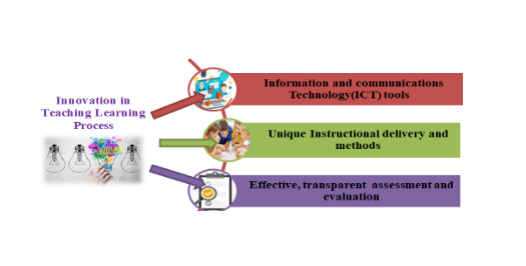
We are categorizing Innovation in Teaching-Learning process in our department into three aspects as shown
Video lecture
Video lectures created by the faculty members are made available in the institute website for the student’s reference.
| T.Geetha | https://youtu.be/nAUhJnglBD4 |
| Jayapradha S | https://youtu.be/Apf5FmAOye8 |
| M.HEMALATHA | https://youtu.be/bkLUQaPeQpM |
| K.RAMYA | https://youtu.be/rPVmWkjI3YM |
| S.FRANCIS SHAMILI | https://youtu.be/1o3O9gHP9hs |
| GOKUL | https://youtu.be/AFrXvdeantA |
| CHINNADURAI | https://www.youtube.com/watch?v=Z2-T2AoS3rw |
| ARUNAPRIYA | https://youtu.be/56G2Q-NiQ20 |
Outcome
Apart from text book and class room lecture, the students will be able to refer this Offline video to clarify their doubts.
Role Play approach
A specific topic will be given to a set of students where they will prepare themselves towards explaining the same by assuming every student with a role.
Outcome
Student understood the approach very well and in easy way how the concept/ procedure/ algorithm work
Think, pair and share approach
Given a topic or concept to any student to think and answer whereas other students will learn and evaluate his/her answer.
Outcome
One student think about the assigned topic and gives his/her views while another student evaluate that what is being learnt.
Question sessions (Viva Voice) for the students
Viva-Voice allows student to orally explain the concept clearly with a better understanding of concepts.
Outcome
This process is useful for the students to make class room interactive and understand the course in an efficient way.
The work must be made available on Institute website.
- The website provides information about the facilities of institution and also department.
- Easy access of the Academic Calendar, University exam Time Table and Learning Materials is enriched and is also continuously updated.
- For the betterment of student community video lectures are available on our college website.
The work must be available for peer review and critique
Departmental Initiatives:
Some of the innovations done by faculty members of Computer Science and Engineering department so as to improve the teaching and learning process.
| S.No | Innovation | Courses used | Description | Impact on Learning | Academic Year |
| 1 | Questioning Strategies (Viva Voice) | In most of subjects questioning strategies are used | This process is helpful for the students to make classroom more interactive and motivates for consistent learning | Effective questioning sessions in classroom diagnose student’s strengths and weaknesses and also develop thinking skills of the students | 2019 - 2020 |
| 2 | NPTEL Video Lectures | Computer Networks | Routing algorithm is explained by faculty as well as video lecture. | Apart from text book and syllabus students get adequate exposure of current technologies through these lectures. | 2020 - 2021 |
| 3 | Think, pair and share approach | Database Management System | Give SQL Queries to any student to think and answer where as other students will learn and evaluate his/her answer. | One student think about the assigned SQL Queries and gives his / her views while another student evaluate that what is being learn. | 2021 - 2022 |
| 4 | Role Play approach | Cryptography and Network Security | Assign Euclid’s algorithm to find highest common factor to 6 students to perform whereas other students will learn and evaluate his/her answer. | Student understood the approach very well and in easy way how greedy algorithm work to optimize solution | 2021 - 2022 |
| 5 | Flipped Learning | In most of subjects are used questioning strategies | The students watch online lectures, collaborate in online discussions, or carry out research at home, while actively engaging concepts in the classroom, with the course teacher’s guidance. | To increase student work on live problem-solving during class time. | 2021 - 2022 |
| 6 | Video Lectures | In most of subjects are used Video Lectures | The links are available in our college web portal. The college web site address is www.dsengg.ac.in | Apart from text book and syllabus students get adequate exposure of current technologies through these lectures | 2022-2023 |
The work must be reproducible and developed further by the other scholars
Reproducibility:
- The information provided in the website is subjected to reproduce and developed further by the scholars, which leads to self-learning.
- Black Board is available at our college website.
- Few corrections are done in Course Handouts, Study Materials, Question Banks, Laboratory manuals and reproduced by the other faculty members..
Statement of clear goals, use of appropriate methods, significance of results, effective presentation and reflective critique.
Statement of clear goals:
- The faculty members are encouraged to participate in workshops and FDP on advanced topics to keep pace with the advanced level of knowledge and skills.
- To enrich the knowledge of faculty through Faculty Enrichment Programme (FEP) and encourage to participate/present papers in National/International Conferences also to publish articles in National/International Journals.
Usage of appropriate methods
Question banks are prepared based on subsequent occurrence on university question paper for all the courses of the department of Computer Science and Engineering are being transferred into the institute website regularly the same is also circulated via group email id. This approach helps the students to concentrate on specific problems which help in improving the results of slow learners.
- Guest lectures, workshops andSeminars are conducted to update students’ knowledge in their stream. This mode of approach helps the rapid learners to enhance the technical skills to a greater extent and enrich their concepts in the curriculum with the industrial oriented applications.
- Chalk and talk method is the common mode of content delivery.
- Usage of LCD projectors and activity-based learning methodology are used whenever required.
- Batch wise determination and three modes of assignments (Written/PPT/Seminar) are implemented.
- Encourage the students towards undergoing In-plant training and hands on training.
- Aids like Text books, Reference books, Supplementary books and University question banks are used.
- Sophisticated resources are provided to support the advancements in pedagogy on campus.Well-equipped and enormous facilities are provided for technological efforts.
ICT TOOLS
Use of ICT tools helps a faculty member to engage students in effective learning and enables learning beyond the classroom.
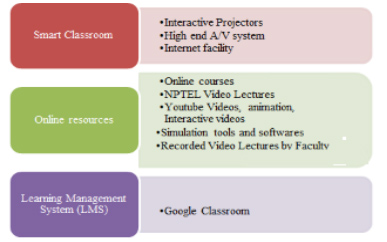
ICT tools practiced in our department through the following aspects is illustrated in
Smart Classroom
Every classroom at our institute is equipped with an interactive projector, Audio and Video system with an internet facility. Classrooms facilitate the instructor and students to use both ICT tools enabled learning and conventional chalk-talk learning.
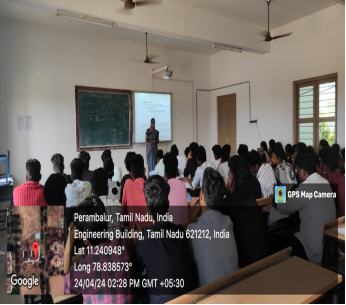
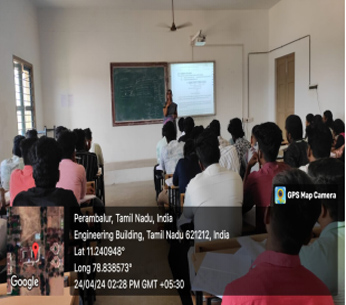
Online resources
All the faculty members are encouraged to use online resources to improve the teaching-learning process. Every faculty member had a practice of pursuing an online course every semester related to the course which makes them be updated. This helps the facultymembers to prepare well for lectures.
Use of NPTEL videos and conceptual videos add value to our teaching-learning process.
Use of virtual lab (hosted by IIT), simulation tools and software make the students get insight knowledge on the subject.
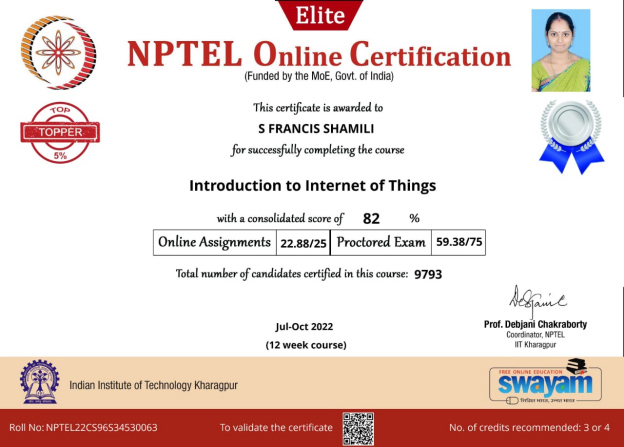
Learning Management System (LMS)
Encouraging the students to learn beyond the classroom environment is achieved in our department by using Learning Management System (LMS). Google classroom is created for all the courses through which the students can access learning resources atanytime.
Innovative learning methods are initiated and implemented by the faculty for students to learn in a better manner.
Professional Society
Professional society at Dhanalakshmi Srinivasan Engineering College (A) is very active. One of the most important functions these societies serve is the dissemination of technical knowledge which helps to ensure engineers remain abreast of recent discoveries and technical advances in this complex and ever changing field. Joining one of these societies is a positive step in making a commitment to lifelong learning.
Professional societies also provide important resources for students such as networking opportunities, career information, and the chance to spend time with people who share a passion for Computer Science and Engineering.
The following are the professional societies in the Department of Computer Science and Engineering.
- Computer Society of India (CSI)
- Indian Society for Technical Education (ISTE)
- International Association of Engineers (IAENG)
- Computer Science Teachers Association (CSTA)
Impact on professional Societies
- Professional society activities, ideas, guidelines or training have been influenced in research.
- Students are able to adapt in wounding frame technologies changing as a result of research.
- Contribution to personal and professional development
- The result is better strategic decision-making, higher levels of professional competence and better services for end users.

Professional Societies
| S. No. | Professional Societies | Student Chapter | Moto | Establishment Year | |
| 1 | 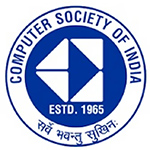 | Computer Society of India (CSI) | YES | To provide a national forum for interaction among IT enthusiast who were a computer user group. | 2013 |
| 2 | 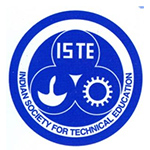 | Indian Society for Technical Education (ISTE) | YES | To provide quality training programmes to teachers and administrators of technical institutions | 2007 |
| 3 | 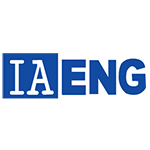 | The International Association of Engineers(IAENG) | NO | Advancement of Academy to Industry | 2019 |
| 4 |  | Computer Science Teachers Association (CSTA) | NO | To empower, engage and advocate teachers worldwide | 2022 |

Indian Society for Technical Education
ISTE stands for the International Society for Technology in Education. The ISTE Standards provide the competencies for learning, teaching and leading in the digital age, providing a comprehensive roadmap for the effective use of technology in schools worldwide. The educator section of the ISTE Standards provides a road map to helping students become empowered learners. These standards will deepen your practice, promote collaboration with peers, challenge you to rethink traditional approaches and prepare students to drive their own learning.
Objectives
To provide quality training programmes to teachers and administrators of technical institutions.
Computer Society Of India

Computer Society of India is a body of computer professionals in India. It was started on 6 March 1965 by a few computer professionals and has now grown to be the national body representing computer professionals. It has 72 chapters across India, 511 student branches, and 100,000 members.
The Computer Society of India is a non-profit professional meet to exchange views and information to learn and share ideas. The wide spectrum of members is committed to the advancement of theory and practice of Computer Engineering and Technology Systems, Science and Engineering, Information Processing and related Arts and Sciences.
The Society also encourages and assists professionals to maintain integrity and competence of the profession and fosters a sense of partnership amongst members. Besides the activities held at the Chapters and Student Branches, the Society also conducts periodic conferences, seminars.
Objectives
To provide a national forum for interaction among IT enthusiast who were a computer user group.
Student ISTE Members
| S.No | Institute Code | Mem. ID. | Reg Number | Student's Name | Valid till |
| 1 | TN237 | 000767 | 810421104001 | AADHIKESAVAN M | 2023-2025 |
| 2 | TN237 | 000768 | 810421104002 | AAKASH R 2023-2025 | |
| 3 | TN237 | 000769 | 810421104003 | AARTHIKA S | 2023-2025 |
| 4 | TN237 | 000770 | 810421104004 | ABDUL KALAM A | 2023-2025 |
| 5 | TN237 | 000771 | 810421104005 | ABIPRASANTH R | 2023-2025 |
| 6 | TN237 | 000772 | 810421104006 | ABISHEK R | 2023-2025 |
| 7 | TN237 | 000773 | 810421104007 | ADITYA KUMAR | 2023-2025 |
| 8 | TN237 | 000774 | 810421104008 | ADITYA KUMAR SAH | 2023-2025 |
| 9 | TN237 | 000775 | 810421104009 | ADWAITH S CHANDRAN | 2023-2025 |
| 10 | TN237 | 000776 | 810421104010 | AFRITH AHAMED A | 2023-2025 |
| 11 | TN237 | 000777 | 810421104012 | AKSHAYA M | 2023-2025 |
| 12 | TN237 | 000778 | 810421104014 | ALOK KUMAR | 2023-2025 |
| 13 | TN237 | 000779 | 810421104015 | ALWIN SANTHOSH KUMAR R | 2023-2025 |
| 14 | TN237 | 000780 | 810421104016 | AMRIT RAJ | 2023-2025 |
| 15 | TN237 | 000781 | 810421104017 | ANANTHA NARAYAN | 2023-2025 |
| 16 | TN237 | 000782 | 810421104018 | ANBARASAN D | 2023-2025 |
| 17 | TN237 | 000783 | 810421104019 | ANITHA S | 2023-2025 |
| 18 | TN237 | 000784 | 810421104020 | ANUSEELAN S | 2023-2025 |
| 19 | TN237 | 000785 | 810421104021 | ANUSHA R | 2023-2025 |
| 20 | TN237 | 000786 | 810421104022 | APSAR MOHAMED A | 2023-2025 |
| 21 | TN237 | 000787 | 810421104023 | ARAVIND S | 2023-2025 |
| 22 | TN237 | 000788 | 810421104024 | ARTHI G | 2023-2025 |
| 23 | TN237 | 000789 | 810421104025 | ARUL SELVAN V | 2023-2025 |
| 24 | TN237 | 000790 | 810421104026 | ARUNKUMAR R | 2023-2025 |
| 25 | TN237 | 000791 | 810421104027 | ARUNPANDIYAN D | 2023-2025 |
| 26 | TN237 | 000792 | 810421104028 | ASATHULLAH S | 2023-2025 |
| 27 | TN237 | 000793 | 810421104029 | ASHISH KUMAR | 2023-2025 |
| 28 | TN237 | 000794 | 810421104031 | ASWIN JOE J | 2023-2025 |
| 29 | TN237 | 000795 | 810421104032 | AVINASH S | 2023-2025 |
| 30 | TN237 | 000796 | 810421104033 | AZAD HUSSAIN | 2023-2025 |
| 31 | TN237 | 000797 | 810421104034 | BALAGOVINDARAJAN B | 2023-2025 |
| 32 | TN237 | 000798 | 810421104035 | BALAGUHAN S | 2023-2025 |
| 33 | TN237 | 000799 | 810421104036 | BALAJI S | 2023-2025 |
| 34 | TN237 | 000800 | 810421104037 | BALAJI S | 2023-2025 |
| 35 | TN237 | 000801 | 810421104038 | BALU M | 2023-2025 |
| 36 | TN237 | 000802 | 810421104039 | BOOBALAN S | 2023-2025 |
| 37 | TN237 | 000803 | 810421104040 | CUBA A R | 2023-2025 |
| 38 | TN237 | 000804 | 810421104041 | DEEPAK RAJ D | 2023-2025 |
| 39 | TN237 | 000805 | 810421104042 | DEEPIKA S | 2023-2025 |
| 40 | TN237 | 000806 | 810421104043 | DHANALAKSHMI C | 2023-2025 |
| 41 | TN237 | 000807 | 810421104044 | DHANUSH ARAVINTH P | 2023-2025 |
| 42 | TN237 | 000808 | 810421104045 | DHANUSH G | 2023-2025 |
| 43 | TN237 | 000809 | 810421104046 | DHANUSH S | 2023-2025 |
| 44 | TN237 | 000810 | 810421104047 | DHASARATH B | 2023-2025 |
| 45 | TN237 | 000811 | 810421104048 | DHATCHANAMOORTHI M | 2023-2025 |
| 46 | TN237 | 000812 | 810421104049 | DINESH KUMAR R | 2023-2025 |
| 47 | TN237 | 000813 | 810421104050 | DINESH P | 2023-2025 |
| 48 | TN237 | 000814 | 810421104051 | EJAS AHAMED S | 2023-2025 |
| 49 | TN237 | 000815 | 810421104052 | ERAMAJAYAM C | 2023-2025 |
| 50 | TN237 | 000816 | 810421104053 | ESWARA PANDIYAN S | 2023-2025 |
| 51 | TN237 | 000817 | 810421104054 | FAHEEM M | 2023-2025 |
| 52 | TN237 | 000818 | 810421104055 | GAJENDARAN P | 2023-2025 |
| 53 | TN237 | 000819 | 810421104056 | GAURAV KUMAR | 2023-2025 |
| 54 | TN237 | 000820 | 810421104057 | GAUTAM KUMAR | 2023-2025 |
| 55 | TN237 | 000821 | 810421104058 | GAYATHRI S | 2023-2025 |
| 56 | TN237 | 000822 | 810421104059 | GAYATRI A | 2023-2025 |
| 57 | TN237 | 000823 | 810421104060 | GOKUL G | 2023-2025 |
| 58 | TN237 | 000824 | 810421104061 | GOPIKA KRISHNAN T | 2023-2025 |
| 59 | TN237 | 000825 | 810421104062 | GOWSHICK R | 2023-2025 |
| 60 | TN237 | 000826 | 810421104063 | GURURASU T | 2023-2025 |
| 61 | TN237 | 000827 | 810421104064 | HADHEE RAHMAN C | 2023-2025 |
| 62 | TN237 | 000828 | 810421104065 | HARIHARAN A | 2023-2025 |
| 63 | TN237 | 000829 | 810421104066 | AARTHY T.R | 2023-2025 |
| 64 | TN237 | 000830 | 810421104067 | ARUN KUMAR M | 2023-2025 |
| 65 | TN237 | 000831 | 810421104068 | BARATH.S | 2023-2025 |
| 66 | TN237 | 000832 | 810421104069 | DEEPA V | 2023-2025 |
| 67 | TN237 | 000833 | 810421104070 | DENISH.E | 2023-2025 |
| 68 | TN237 | 000834 | 810421104071 | KARTHIK RAJA M | 2023-2025 |
| 69 | TN237 | 000835 | 810421104072 | HARIHARAN B | 2023-2025 |
| 70 | TN237 | 000836 | 810421104073 | HARIHARAN C | 2023-2025 |
| 71 | TN237 | 000837 | 810421104074 | HARIKARAN K | 2023-2025 |
| 72 | TN237 | 000838 | 810421104075 | HARISH P | 2023-2025 |
| 73 | TN237 | 000839 | 810421104076 | HARSHINI DEVI G | 2023-2025 |
| 74 | TN237 | 000840 | 810421104077 | JAGADHEESAN A | 2023-2025 |
| 75 | TN237 | 000841 | 810421104078 | JAYAJOTHI J | 2023-2025 |
| 76 | TN237 | 000842 | 810421104079 | JAYASANTHIYA S | 2023-2025 |
| 77 | TN237 | 000843 | 810421104080 | JERO SHELDON J | 2023-2025 |
| 78 | TN237 | 000844 | 810421104081 | JIGAR SINGH | 2023-2025 |
| 79 | TN237 | 000845 | 810421104082 | JOEGUS DERISON L | 2023-2025 |
| 80 | TN237 | 000846 | 810421104083 | KABILAN D | 2023-2025 |
| 81 | TN237 | 000847 | 810421104084 | KAMALI R | 2023-2025 |
| 82 | TN237 | 000848 | 810421104085 | KARAN KUMAR SAHANI | 2023-2025 |
| 83 | TN237 | 000849 | 810421104086 | KARIKALAN T | 2023-2025 |
| 84 | TN237 | 000850 | 810421104087 | KARTHIGA S | 2023-2025 |
| 85 | TN237 | 000851 | 810421104088 | KARTHIKRAJ S | 2023-2025 |
| 86 | TN237 | 000852 | 810421104089 | KATHIRVALAVAN G | 2023-2025 |
| 87 | TN237 | 000853 | 810421104090 | KAVIYA B | 2023-2025 |
| 88 | TN237 | 000854 | 810421104091 | KEERTHANA K | 2023-2025 |
| 89 | TN237 | 000855 | 810421104092 | KEERTHI V | 2023-2025 |
| 90 | TN237 | 000856 | 810421104093 | KENES K ROBY | 2023-2025 |
| 91 | TN237 | 000857 | 810421104094 | KRISHNARAJ K | 2023-2025 |
| 92 | TN237 | 000858 | 810421104095 | LAKSHMI R | 2023-2025 |
| 93 | TN237 | 000859 | 810421104096 | LASHIYA M | 2023-2025 |
| 94 | TN237 | 000860 | 810421104097 | MADHUMITHA M | 2023-2025 |
| 95 | TN237 | 000861 | 810421104098 | MANIKANDAN R | 2023-2025 |
| 96 | TN237 | 000862 | 810421104099 | MANIKKARAJ R | 2023-2025 |
| 97 | TN237 | 000863 | 810421104100 | MANOJALEX G | 2023-2025 |
| 98 | TN237 | 000864 | 810421104101 | MARIYA VIANNEY A | 2023-2025 |
| 99 | TN237 | 000865 | 810421104103 | MD SHAHID ANSARI | 2023-2025 |
| 100 | TN237 | 000866 | 810421104104 | MD SHAKIL ANSARI | 2023-2025 |
| 101 | TN237 | 000867 | 810421104105 | MD ZAID NAWAJ | 2023-2025 |
| 102 | TN237 | 000868 | 810421104106 | MOHAMED IRFAN J | 2023-2025 |
| 103 | TN237 | 000869 | 810421104107 | MOHAMED THOUFIK K | 2023-2025 |
| 104 | TN237 | 000870 | 810421104108 | MUGUNTHAN P | 2023-2025 |
| 105 | TN237 | 000871 | 810421104109 | MUTHAZHAGAN R | 2023-2025 |
| 106 | TN237 | 000872 | 810421104110 | MUTHUKUMARAN M | 2023-2025 |
| 107 | TN237 | 000873 | 810421104112 | NANDHAKISHORE O | 2023-2025 |
| 108 | TN237 | 000874 | 810421104113 | NANDHAKUMARAN S | 2023-2025 |
| 109 | TN237 | 000875 | 810421104114 | NAVEEN KUMAR S | 2023-2025 |
| 110 | TN237 | 000876 | 810421104115 | NAVEENA V | 2023-2025 |
| 111 | TN237 | 000877 | 810421104116 | NIKIL S | 2023-2025 |
| 112 | TN237 | 000878 | 810421104117 | NIKILAN M | 2023-2025 |
| 113 | TN237 | 000879 | 810421104118 | NISHANTH S | 2023-2025 |
| 114 | TN237 | 000880 | 810421104119 | NIVETHA S | 2023-2025 |
| 115 | TN237 | 000881 | 810421104120 | NIVETHA T | 2023-2025 |
| 116 | TN237 | 000882 | 810421104121 | OPPILAMANI L | 2023-2025 |
| 117 | TN237 | 000883 | 810421104122 | PRABU A | 2023-2025 |
| 118 | TN237 | 000884 | 810421104123 | PRADEEP S | 2023-2025 |
| 119 | TN237 | 000885 | 810421104124 | PRASANTH D | 2023-2025 |
| 120 | TN237 | 000886 | 810421104125 | PRASANTH M | 2023-2025 |
| 121 | TN237 | 000887 | 810421104126 | PRATHIBA C S | 2023-2025 |
| 122 | TN237 | 000888 | 810421104127 | PRATHYUSH N P | 2023-2025 |
| 123 | TN237 | 000889 | 810421104128 | PRAVIN M | 2023-2025 |
| 124 | TN237 | 000890 | 810421104129 | PREETHI B | 2023-2025 |
| 125 | TN237 | 000891 | 810421104130 | PREMKUMAR K | 2023-2025 |
| 126 | TN237 | 000892 | 810421104131 | PRINCE KUMAR | 2023-2025 |
| 127 | TN237 | 000893 | 810421104132 | PRIYANKA R | 2023-2025 |
| 128 | TN237 | 000894 | 810421104133 | RADHAKRISHNAN R | 2023-2025 |
| 129 | TN237 | 000895 | 810421104134 | RAGAPRIYA J | 2023-2025 |
| 130 | TN237 | 000896 | 810421104135 | RAGHULKISHORE R | 2023-2025 |
| 131 | TN237 | 000897 | 810421104136 | GOPI | 2023-2025 |
| 132 | TN237 | 000898 | 810421104137 | KAMALRAJ B | 2023-2025 |
| 133 | TN237 | 000899 | 810421104138 | MOHAMMED YASIR | 2023-2025 |
| 134 | TN237 | 000900 | 810421104139 | SEKADHARAN | 2023-2025 |
| 135 | TN237 | 000901 | 810421104140 | VIKRAM | 2023-2025 |
| 136 | TN237 | 000902 | 810421104141 | RAGHURAMAN R | 2023-2025 |
| 137 | TN237 | 000903 | 810421104142 | RAGUPATHI R | 2023-2025 |
| 138 | TN237 | 000904 | 810421104143 | RAHUL KUMAR | 2023-2025 |
| 139 | TN237 | 000905 | 810421104144 | RAJA R | 2023-2025 |
| 140 | TN237 | 000906 | 810421104145 | RAJESH A | 2023-2025 |
| 141 | TN237 | 000907 | 810421104146 | RAJESH R | 2023-2025 |
| 142 | TN237 | 000908 | 810421104147 | RAJESH S | 2023-2025 |
| 143 | TN237 | 000909 | 810421104148 | RAMIS RAJ L | 2023-2025 |
| 144 | TN237 | 000910 | 810421104149 | RATHNA V | 2023-2025 |
| 145 | TN237 | 000911 | 810421104150 | RAUSHAN KUMAR | 2023-2025 |
| 146 | TN237 | 000912 | 810421104151 | RITHIKA K | 2023-2025 |
| 147 | TN237 | 000913 | 810421104152 | RIYAZ AHAMED J | 2023-2025 |
| 148 | TN237 | 000914 | 810421104153 | ROSHAN KUMAR | 2023-2025 |
| 149 | TN237 | 000915 | 810421104154 | RUPESH KUMAR | 2023-2025 |
| 150 | TN237 | 000916 | 810421104155 | SABARI P | 2023-2025 |
| 151 | TN237 | 000917 | 810421104156 | SACHIN KUMAR | 2023-2025 |
| 152 | TN237 | 000918 | 810421104157 | SAKTHI T | 2023-2025 |
| 153 | TN237 | 000919 | 810421104158 | SALMAN KHAN N | 2023-2025 |
| 154 | TN237 | 000920 | 810421104159 | SANNI KRANJAN KUMAR | 2023-2025 |
| 155 | TN237 | 000921 | 810421104160 | SANSHAY KUMAR TIWARY | 2023-2025 |
| 156 | TN237 | 000922 | 810421104161 | SANTHOSH B | 2023-2025 |
| 157 | TN237 | 000923 | 810421104162 | SANTHOSH K | 2023-2025 |
| 158 | TN237 | 000924 | 810421104163 | SANTHOSH KUMAR M | 2023-2025 |
| 159 | TN237 | 000925 | 810421104164 | SANTHOSH R | 2023-2025 |
| 160 | TN237 | 000926 | 810421104165 | SARAN N | 2023-2025 |
| 161 | TN237 | 000927 | 810421104166 | SARAN N | 2023-2025 |
| 162 | TN237 | 000928 | 810421104167 | SARANYA A K | 2023-2025 |
| 163 | TN237 | 000929 | 810421104168 | SARATHI T | 2023-2025 |
| 164 | TN237 | 000930 | 810421104169 | SARAVANAN K | 2023-2025 |
| 165 | TN237 | 000931 | 810421104170 | SASIKALA E | 2023-2025 |
| 166 | TN237 | 000932 | 810421104171 | SHALINI P | 2023-2025 |
| 167 | TN237 | 000933 | 810421104172 | SHANTANU KUMAR YADAV | 2023-2025 |
| 168 | TN237 | 000934 | 810421104173 | SHEELA R | 2023-2025 |
| 169 | TN237 | 000935 | 810421104174 | SIDHIQUL AFLAH | 2023-2025 |
| 170 | TN237 | 000936 | 810421104176 | SIVASAKTHI S | 2023-2025 |
| 171 | TN237 | 000937 | 810421104177 | SIVASAKTHI S | 2023-2025 |
| 172 | TN237 | 000938 | 810421104178 | SOUNDARAJAN M | 2023-2025 |
| 173 | TN237 | 000939 | 810421104179 | SRIKANTH M | 2023-2025 |
| 174 | TN237 | 000940 | 810421104180 | SRIRAM R K | 2023-2025 |
| 175 | TN237 | 000941 | 810421104181 | SUBASH S | 2023-2025 |
| 176 | TN237 | 000942 | 810421104182 | SUBASHREE K | 2023-2025 |
| 177 | TN237 | 000943 | 810421104183 | SUGUMARAN M | 2023-2025 |
| 178 | TN237 | 000944 | 810421104184 | SURAJ KUMAR | 2023-2025 |
| 179 | TN237 | 000945 | 810421104185 | SURESH P | 2023-2025 |
| 180 | TN237 | 000946 | 810421104186 | SURIYAPRAKASH S | 2023-2025 |
| 181 | TN237 | 000947 | 810421104187 | TAMIZHANBU B | 2023-2025 |
| 182 | TN237 | 000948 | 810421104188 | THANIGASALAM V | 2023-2025 |
| 183 | TN237 | 000949 | 810421104189 | THIRISHA M | 2023-2025 |
| 184 | TN237 | 000950 | 810421104190 | THIRUMALAI T | 2023-2025 |
| 185 | TN237 | 000951 | 810421104191 | THOUBIC IMRAN M | 2023-2025 |
| 186 | TN237 | 000952 | 810421104192 | THUFAIL N | 2023-2025 |
| 187 | TN237 | 000953 | 810421104301 | TIBIN ROBY | 2023-2025 |
| 188 | TN237 | 000954 | 810421104303 | VASANTHAKUMAR S | 2023-2025 |
| 189 | TN237 | 000955 | 810421104304 | VENKADESH R | 2023-2025 |
| 190 | TN237 | 000956 | 810421104305 | VIGNESHWARAN M | 2023-2025 |
| 191 | TN237 | 000957 | 810421104306 | VIHINESHWARAN M | 2023-2025 |
| 192 | TN237 | 000958 | 810421104307 | VIJAY R | 2023-2025 |
| 193 | TN237 | 000959 | 810421104308 | VIKASH KUMAR | 2023-2025 |
| 194 | TN237 | 000960 | 810421104309 | VIKRAM S | 2023-2025 |
| 195 | TN237 | 000961 | 810421104310 | VISVA A | 2023-2025 |
| 196 | TN237 | 000962 | 810421104311 | YOGESHWARI D | 2023-2025 |
| 197 | TN237 | 000963 | 810421104312 | YUVARAJ K | 2023-2025 |
| 198 | TN237 | 000964 | 810421104313 | BALAMURUGAN.S | 2023-2025 |
| 199 | TN237 | 000965 | 810421104314 | DANIEL ASHIK RAJ.A | 2023-2025 |
| 200 | TN237 | 000966 | 810421104315 | MURGANSWAMI | 2023-2025 |
| 201 | TN237 | 000967 | 810421104316 | SHAFIQDEEN.S | 2023-2025 |
| 202 | TN237 | 000968 | 810421104317 | SURENDAR.R | 2023-2025 |
Student CSI Members List
| S.No | Mem. ID. | Student's Name | Valid till | College Name & Address | Chapter Name | IM-No |
| 1 | 01600699 | Aarthi P | 31.10.2024 | Dhanalakshmi Srinivasan Engineering College | Tiruchirappalli | M10606 |
| 2 | 01600700 | Abinesh K. S | 31.10.2024 | Dhanalakshmi Srinivasan Engineering College | Tiruchirappalli | M10606 |
| 3 | 01600701 | Abinesh A | 31.10.2024 | Dhanalakshmi Srinivasan Engineering College | Tiruchirappalli | M10606 |
| 4 | 01600702 | Abinesh S | 31.10.2024 | Dhanalakshmi Srinivasan Engineering College | Tiruchirappalli | M10606 |
| 5 | 01600703 | Abishek A | 31.10.2024 | Dhanalakshmi Srinivasan Engineering College | Tiruchirappalli | M10606 |
| 6 | 01600704 | Ajai S | 31.10.2024 | Dhanalakshmi Srinivasan Engineering College | Tiruchirappalli | M10606 |
| 7 | 01600705 | Akalya S | 31.10.2024 | Dhanalakshmi Srinivasan Engineering College | Tiruchirappalli | M10606 |
| 8 | 01600706 | Akash R | 31.10.2024 | Dhanalakshmi Srinivasan Engineering College | Tiruchirappalli | M10606 |
| 9 | 01600707 | Akash T | 31.10.2024 | Dhanalakshmi Srinivasan Engineering College | Tiruchirappalli | M10606 |
| 10 | 01600708 | Akash.A | 31.10.2024 | Dhanalakshmi Srinivasan Engineering College | Tiruchirappalli | M10606 |
| 11 | 01600709 | Akilan.E | 31.10.2024 | Dhanalakshmi Srinivasan Engineering College | Tiruchirappalli | M10606 |
| 12 | 01600710 | Ananth.K | 31.10.2024 | Dhanalakshmi Srinivasan Engineering College | Tiruchirappalli | M10606 |
| 13 | 01600711 | Anitha. A | 31.10.2024 | Dhanalakshmi Srinivasan Engineering College | Tiruchirappalli | M10606 |
| 14 | 01600712 | Aravind.A | 31.10.2024 | Dhanalakshmi Srinivasan Engineering College | Tiruchirappalli | M10606 |
| 15 | 01600713 | Arun Iyyappan | 31.10.2024 | Dhanalakshmi Srinivasan Engineering College | Tiruchirappalli | M10606 |
| 16 | 01600714 | Arunkumar. S | 31.10.2024 | Dhanalakshmi Srinivasan Engineering College | Tiruchirappalli | M10606 |
| 17 | 01600715 | Ashkar.A | 31.10.2024 | Dhanalakshmi Srinivasan Engineering College | Tiruchirappalli | M10606 |
| 18 | 01600716 | Ashok Kumar P | 31.10.2024 | Dhanalakshmi Srinivasan Engineering College | Tiruchirappalli | M10606 |
| 19 | 01600717 | Balaji. K | 31.10.2024 | Dhanalakshmi Srinivasan Engineering College | Tiruchirappalli | M10606 |
| 20 | 01600718 | Balaji.M | 31.10.2024 | Dhanalakshmi Srinivasan Engineering College | Tiruchirappalli | M10606 |
| 21 | 01600719 | Balaji P | 31.10.2024 | Dhanalakshmi Srinivasan Engineering College | Tiruchirappalli | M10606 |
| 22 | 01600720 | Balamurugan P | 31.10.2024 | Dhanalakshmi Srinivasan Engineering College | Tiruchirappalli | M10606 |
| 23 | 01600721 | Balasubramanian.M | 31.10.2024 | Dhanalakshmi Srinivasan Engineering College | Tiruchirappalli | M10606 |
| 24 | 01600722 | Barath K | 31.10.2024 | Dhanalakshmi Srinivasan Engineering College | Tiruchirappalli | M10606 |
| 25 | 01600723 | Bhakiyalakshmi.G | 31.10.2024 | Dhanalakshmi Srinivasan Engineering College | Tiruchirappalli | M10606 |
| 26 | 01600724 | Boomika.M | 31.10.2024 | Dhanalakshmi Srinivasan Engineering College | Tiruchirappalli | M10606 |
| 27 | 01600725 | Cheran G | 31.10.2024 | Dhanalakshmi Srinivasan Engineering College | Tiruchirappalli | M10606 |
| 28 | 01600726 | Christo Edwinraj V | 31.10.2024 | Dhanalakshmi Srinivasan Engineering College | Tiruchirappalli | M10606 |
| 29 | 01600727 | Deepika S | 31.10.2024 | Dhanalakshmi Srinivasan Engineering College | Tiruchirappalli | M10606 |
| 30 | 01600728 | Devadharsan.S | 31.10.2024 | Dhanalakshmi Srinivasan Engineering College | Tiruchirappalli | M10606 |
| 31 | 01600729 | Devika. P | 31.10.2024 | Dhanalakshmi Srinivasan Engineering College | Tiruchirappalli | M10606 |
| 32 | 01600730 | Dhanush T | 31.10.2024 | Dhanalakshmi Srinivasan Engineering College | Tiruchirappalli | M10606 |
| 33 | 01600731 | Dhanusya S | 31.10.2024 | Dhanalakshmi Srinivasan Engineering College | Tiruchirappalli | M10606 |
| 34 | 01600732 | Dharshini.P | 31.10.2024 | Dhanalakshmi Srinivasan Engineering College | Tiruchirappalli | M10606 |
| 35 | 01600733 | Dhivya Priya.R | 31.10.2024 | Dhanalakshmi Srinivasan Engineering College | Tiruchirappalli | M10606 |
| 36 | 01600734 | Dinesh V | 31.10.2024 | Dhanalakshmi Srinivasan Engineering College | Tiruchirappalli | M10606 |
| 37 | 01600735 | Elanthendral.J | 31.10.2024 | Dhanalakshmi Srinivasan Engineering College | Tiruchirappalli | M10606 |
| 38 | 01600736 | Ezhilan.K | 31.10.2024 | Dhanalakshmi Srinivasan Engineering College | Tiruchirappalli | M10606 |
| 39 | 01600737 | Gayathri.J.A | 31.10.2024 | Dhanalakshmi Srinivasan Engineering College | Tiruchirappalli | M10606 |
| 40 | 01600738 | Gayathri T | 31.10.2024 | Dhanalakshmi Srinivasan Engineering College | Tiruchirappalli | M10606 |
| 41 | 01600739 | Gokul S | 31.10.2024 | Dhanalakshmi Srinivasan Engineering College | Tiruchirappalli | M10606 |
| 42 | 01600740 | Gokulnath.G | 31.10.2024 | Dhanalakshmi Srinivasan Engineering College | Tiruchirappalli | M10606 |
| 43 | 01600741 | Gopi G | 31.10.2024 | Dhanalakshmi Srinivasan Engineering College | Tiruchirappalli | M10606 |
| 44 | 01600742 | Gowtham D | 31.10.2024 | Dhanalakshmi Srinivasan Engineering College | Tiruchirappalli | M10606 |
| 45 | 01600743 | Grithika. R | 31.10.2024 | Dhanalakshmi Srinivasan Engineering College | Tiruchirappalli | M10606 |
| 46 | 01600744 | Guganathan M | 31.10.2024 | Dhanalakshmi Srinivasan Engineering College | Tiruchirappalli | M10606 |
| 47 | 01600745 | Guna D | 31.10.2024 | Dhanalakshmi Srinivasan Engineering College | Tiruchirappalli | M10606 |
| 48 | 01600746 | Hariharan.A | 31.10.2024 | Dhanalakshmi Srinivasan Engineering College | Tiruchirappalli | M10606 |
| 49 | 01600747 | Hariharan A | 31.10.2024 | Dhanalakshmi Srinivasan Engineering College | Tiruchirappalli | M10606 |
| 50 | 01600748 | Hariharan.R | 31.10.2024 | Dhanalakshmi Srinivasan Engineering College | Tiruchirappalli | M10606 |
| 51 | 01600749 | Harish.K | 31.10.2024 | Dhanalakshmi Srinivasan Engineering College | Tiruchirappalli | M10606 |
| 52 | 01600750 | Haysheena.G | 31.10.2024 | Dhanalakshmi Srinivasan Engineering College | Tiruchirappalli | M10606 |
| 53 | 01600751 | Hemanthan. G | 31.10.2024 | Dhanalakshmi Srinivasan Engineering College | Tiruchirappalli | M10606 |
| 54 | 01600752 | Idhris Ahamed.J | 31.10.2024 | Dhanalakshmi Srinivasan Engineering College | Tiruchirappalli | M10606 |
| 55 | 01600753 | Janahar V | 31.10.2024 | Dhanalakshmi Srinivasan Engineering College | Tiruchirappalli | M10606 |
| 56 | 01600754 | Janakiraman S | 31.10.2024 | Dhanalakshmi Srinivasan Engineering College | Tiruchirappalli | M10606 |
| 57 | 01600755 | Jeeva M | 31.10.2024 | Dhanalakshmi Srinivasan Engineering College | Tiruchirappalli | M10606 |
| 58 | 01600756 | Jeevadharshini. S | 31.10.2024 | Dhanalakshmi Srinivasan Engineering College | Tiruchirappalli | M10606 |
| 59 | 01600757 | Jeevitha.S.J | 31.10.2024 | Dhanalakshmi Srinivasan Engineering College | Tiruchirappalli | M10606 |
| 60 | 01600758 | Kalaiyarasan.K | 31.10.2024 | Dhanalakshmi Srinivasan Engineering College | Tiruchirappalli | M10606 |
| 61 | 01600759 | Kameshwari.S | 31.10.2024 | Dhanalakshmi Srinivasan Engineering College | Tiruchirappalli | M10606 |
| 62 | 01600760 | Kannan.S | 31.10.2024 | Dhanalakshmi Srinivasan Engineering College | Tiruchirappalli | M10606 |
| 63 | 01600761 | Karpagamoorthy K | 31.10.2024 | Dhanalakshmi Srinivasan Engineering College | Tiruchirappalli | M10606 |
| 64 | 01600762 | Kathiravan D | 31.10.2024 | Dhanalakshmi Srinivasan Engineering College | Tiruchirappalli | M10606 |
| 65 | 01600763 | Kavin K R | 31.10.2024 | Dhanalakshmi Srinivasan Engineering College | Tiruchirappalli | M10606 |
| 66 | 01600764 | Kaviya R | 31.10.2024 | Dhanalakshmi Srinivasan Engineering College | Tiruchirappalli | M10606 |
| 67 | 01600765 | Kaviya S | 31.10.2024 | Dhanalakshmi Srinivasan Engineering College | Tiruchirappalli | M10606 |
| 68 | 01600766 | Kaviya T | 31.10.2024 | Dhanalakshmi Srinivasan Engineering College | Tiruchirappalli | M10606 |
| 69 | 01600767 | Keerthana A R | 31.10.2024 | Dhanalakshmi Srinivasan Engineering College | Tiruchirappalli | M10606 |
| 70 | 01600768 | Kelly Josephine Raj A | 31.10.2024 | Dhanalakshmi Srinivasan Engineering College | Tiruchirappalli | M10606 |
| 71 | 01600769 | Kiran Caberil R | 31.10.2024 | Dhanalakshmi Srinivasan Engineering College | Tiruchirappalli | M10606 |
| 72 | 01600770 | Kirubashini S | 31.10.2024 | Dhanalakshmi Srinivasan Engineering College | Tiruchirappalli | M10606 |
| 73 | 01600771 | Kiruthika A | 31.10.2024 | Dhanalakshmi Srinivasan Engineering College | Tiruchirappalli | M10606 |
| 74 | 01600772 | Kiruthika C | 31.10.2024 | Dhanalakshmi Srinivasan Engineering College | Tiruchirappalli | M10606 |
| 75 | 01600773 | Kiruthika S | 31.10.2024 | Dhanalakshmi Srinivasan Engineering College | Tiruchirappalli | M10606 |
| 76 | 01600774 | Kowsalya P | 31.10.2024 | Dhanalakshmi Srinivasan Engineering College | Tiruchirappalli | M10606 |
| 77 | 01600775 | Krishnabharathi S | 31.10.2024 | Dhanalakshmi Srinivasan Engineering College | Tiruchirappalli | M10606 |
| 78 | 01600776 | Kumar R | 31.10.2024 | Dhanalakshmi Srinivasan Engineering College | Tiruchirappalli | M10606 |
| 79 | 01600777 | Lakshmiprabha N | 31.10.2024 | Dhanalakshmi Srinivasan Engineering College | Tiruchirappalli | M10606 |
| 80 | 01600778 | Lavanya M | 31.10.2024 | Dhanalakshmi Srinivasan Engineering College | Tiruchirappalli | M10606 |
| 81 | 01600779 | Madhan M | 31.10.2024 | Dhanalakshmi Srinivasan Engineering College | Tiruchirappalli | M10606 |
| 82 | 01600780 | Madhubalan S | 31.10.2024 | Dhanalakshmi Srinivasan Engineering College | Tiruchirappalli | M10606 |
| 83 | 01600781 | Madhumitha R | 31.10.2024 | Dhanalakshmi Srinivasan Engineering College | Tiruchirappalli | M10606 |
| 84 | 01600782 | Mahendran S | 31.10.2024 | Dhanalakshmi Srinivasan Engineering College | Tiruchirappalli | M10606 |
| 85 | 01600783 | Maheswaran M | 31.10.2024 | Dhanalakshmi Srinivasan Engineering College | Tiruchirappalli | M10606 |
| 86 | 01600784 | Maniraja K | 31.10.2024 | Dhanalakshmi Srinivasan Engineering College | Tiruchirappalli | M10606 |
| 87 | 01600785 | Mano A | 31.10.2024 | Dhanalakshmi Srinivasan Engineering College | Tiruchirappalli | M10606 |
| 88 | 01600786 | Manojkumar K | 31.10.2024 | Dhanalakshmi Srinivasan Engineering College | Tiruchirappalli | M10606 |
| 89 | 01600787 | Mohammed Jubair A | 31.10.2024 | Dhanalakshmi Srinivasan Engineering College | Tiruchirappalli | M10606 |
| 90 | 01600788 | Mohammed Siddhik A | 31.10.2024 | Dhanalakshmi Srinivasan Engineering College | Tiruchirappalli | M10606 |
| 91 | 01600789 | Mohanraj C | 31.10.2024 | Dhanalakshmi Srinivasan Engineering College | Tiruchirappalli | M10606 |
| 92 | 01600790 | Mouni R | 31.10.2024 | Dhanalakshmi Srinivasan Engineering College | Tiruchirappalli | M10606 |
| 93 | 01600791 | Muniya Dinesh R | 31.10.2024 | Dhanalakshmi Srinivasan Engineering College | Tiruchirappalli | M10606 |
| 94 | 01600792 | Muthamilselvi M | 31.10.2024 | Dhanalakshmi Srinivasan Engineering College | Tiruchirappalli | M10606 |
| 95 | 01600793 | Naveen Kumar S | 31.10.2024 | Dhanalakshmi Srinivasan Engineering College | Tiruchirappalli | M10606 |
| 96 | 01600794 | Navitha R | 31.10.2024 | Dhanalakshmi Srinivasan Engineering College | Tiruchirappalli | M10606 |
| 97 | 01600795 | Nivetha R | 31.10.2024 | Dhanalakshmi Srinivasan Engineering College | Tiruchirappalli | M10606 |
| 98 | 01600796 | Parameshwaran V | 31.10.2024 | Dhanalakshmi Srinivasan Engineering College | Tiruchirappalli | M10606 |
| 99 | 01600797 | Parkavi R | 31.10.2024 | Dhanalakshmi Srinivasan Engineering College | Tiruchirappalli | M10606 |
| 100 | 01600798 | Parkaviyan P | 31.10.2024 | Dhanalakshmi Srinivasan Engineering College | Tiruchirappalli | M10606 |
| 101 | 01600799 | Pavithran M | 31.10.2024 | Dhanalakshmi Srinivasan Engineering College | Tiruchirappalli | M10606 |
| 102 | 01600800 | Prabha D | 31.10.2024 | Dhanalakshmi Srinivasan Engineering College | Tiruchirappalli | M10606 |
| 103 | 01600801 | Prabha S | 31.10.2024 | Dhanalakshmi Srinivasan Engineering College | Tiruchirappalli | M10606 |
| 104 | 01600802 | Pradeep M | 31.10.2024 | Dhanalakshmi Srinivasan Engineering College | Tiruchirappalli | M10606 |
| 105 | 01600803 | Pragathish P | 31.10.2024 | Dhanalakshmi Srinivasan Engineering College | Tiruchirappalli | M10606 |
| 106 | 01600804 | Prakash Raj M | 31.10.2024 | Dhanalakshmi Srinivasan Engineering College | Tiruchirappalli | M10606 |
| 107 | 01600805 | Praveen Kumar N | 31.10.2024 | Dhanalakshmi Srinivasan Engineering College | Tiruchirappalli | M10606 |
| 108 | 01600806 | Praveen Kumar S | 31.10.2024 | Dhanalakshmi Srinivasan Engineering College | Tiruchirappalli | M10606 |
| 109 | 01600807 | Priya Dharshini R | 31.10.2024 | Dhanalakshmi Srinivasan Engineering College | Tiruchirappalli | M10606 |
| 110 | 01600808 | Rakesh J | 31.10.2024 | Dhanalakshmi Srinivasan Engineering College | Tiruchirappalli | M10606 |
| 111 | 01600809 | Ramkumar R | 31.10.2024 | Dhanalakshmi Srinivasan Engineering College | Tiruchirappalli | M10606 |
| 112 | 01600810 | Ramya R | 31.10.2024 | Dhanalakshmi Srinivasan Engineering College | Tiruchirappalli | M10606 |
| 113 | 01600811 | Ravivarman A | 31.10.2024 | Dhanalakshmi Srinivasan Engineering College | Tiruchirappalli | M10606 |
| 114 | 01600812 | Roshini M | 31.10.2024 | Dhanalakshmi Srinivasan Engineering College | Tiruchirappalli | M10606 |
| 115 | 01600813 | Sakthivel C | 31.10.2024 | Dhanalakshmi Srinivasan Engineering College | Tiruchirappalli | M10606 |
| 116 | 01600814 | Sakthivel S | 31.10.2024 | Dhanalakshmi Srinivasan Engineering College | Tiruchirappalli | M10606 |
| 117 | 01600815 | Sanjay Prasath S | 31.10.2024 | Dhanalakshmi Srinivasan Engineering College | Tiruchirappalli | M10606 |
| 118 | 01600816 | Sanjay S | 31.10.2024 | Dhanalakshmi Srinivasan Engineering College | Tiruchirappalli | M10606 |
| 119 | 01600817 | Santhosh C | 31.10.2024 | Dhanalakshmi Srinivasan Engineering College | Tiruchirappalli | M10606 |
| 120 | 01600818 | Santhosh R | 31.10.2024 | Dhanalakshmi Srinivasan Engineering College | Tiruchirappalli | M10606 |
| 121 | 01600819 | Santhoshkumar A | 31.10.2024 | Dhanalakshmi Srinivasan Engineering College | Tiruchirappalli | M10606 |
| 122 | 01600820 | Aadith H | 31.10.2024 | Dhanalakshmi Srinivasan Engineering College | Tiruchirappalli | M10606 |
| 123 | 01600821 | Dhananjay Kumar Suryesh | 31.10.2024 | Dhanalakshmi Srinivasan Engineering College | Tiruchirappalli | M10606 |
| 124 | 01600822 | Jovakwin Litinov | 31.10.2024 | Dhanalakshmi Srinivasan Engineering College | Tiruchirappalli | M10606 |
| 125 | 01600823 | Raushan Kumar | 31.10.2024 | Dhanalakshmi Srinivasan Engineering College | Tiruchirappalli | M10606 |
| 126 | 01600824 | Saranraj.C | 31.10.2024 | Dhanalakshmi Srinivasan Engineering College | Tiruchirappalli | M10606 |
| 127 | 01600825 | Saranraj.T | 31.10.2024 | Dhanalakshmi Srinivasan Engineering College | Tiruchirappalli | M10606 |
| 128 | 01600826 | Sasikala.S | 31.10.2024 | Dhanalakshmi Srinivasan Engineering College | Tiruchirappalli | M10606 |
| 129 | 01600827 | Sathish.K | 31.10.2024 | Dhanalakshmi Srinivasan Engineering College | Tiruchirappalli | M10606 |
| 130 | 01600828 | Sathiya Priya.J | 31.10.2024 | Dhanalakshmi Srinivasan Engineering College | Tiruchirappalli | M10606 |
| 131 | 01600829 | Selvabarathi.N | 31.10.2024 | Dhanalakshmi Srinivasan Engineering College | Tiruchirappalli | M10606 |
| 132 | 01600830 | Shobana.P | 31.10.2024 | Dhanalakshmi Srinivasan Engineering College | Tiruchirappalli | M10606 |
| 133 | 01600831 | Sivakami.S | 31.10.2024 | Dhanalakshmi Srinivasan Engineering College | Tiruchirappalli | M10606 |
| 134 | 01600832 | Sivarajan.K | 31.10.2024 | Dhanalakshmi Srinivasan Engineering College | Tiruchirappalli | M10606 |
| 135 | 01600833 | Sivasubramaniyam.S | 31.10.2024 | Dhanalakshmi Srinivasan Engineering College | Tiruchirappalli | M10606 |
| 36 | 01600834 | Sneha.S | 31.10.2024 | Dhanalakshmi Srinivasan Engineering College | Tiruchirappalli | M10606 |
| 137 | 01600835 | Sneka.S | 31.10.2024 | Dhanalakshmi Srinivasan Engineering College | Tiruchirappalli | M10606 |
| 138 | 01600836 | Sridhar.J | 31.10.2024 | Dhanalakshmi Srinivasan Engineering College | Tiruchirappalli | M10606 |
| 139 | 01600837 | Srihari.S | 31.10.2024 | Dhanalakshmi Srinivasan Engineering College | Tiruchirappalli | M10606 |
| 140 | 01600838 | Srimathi.A | 31.10.2024 | Dhanalakshmi Srinivasan Engineering College | Tiruchirappalli | M10606 |
| 141 | 01600839 | Sriram Kumar. S | 31.10.2024 | Dhanalakshmi Srinivasan Engineering College | Tiruchirappalli | M10606 |
| 142 | 01600840 | Sudaroli.S | 31.10.2024 | Dhanalakshmi Srinivasan Engineering College | Tiruchirappalli | M10606 |
| 143 | 01600841 | Sudharsan .V | 31.10.2024 | Dhanalakshmi Srinivasan Engineering College | Tiruchirappalli | M10606 |
| 144 | 01600842 | Suganya.K | 31.10.2024 | Dhanalakshmi Srinivasan Engineering College | Tiruchirappalli | M10606 |
| 145 | 01600843 | Sujitha.B | 31.10.2024 | Dhanalakshmi Srinivasan Engineering College | Tiruchirappalli | M10606 |
| 146 | 01600844 | Surya.G | 31.10.2024 | Dhanalakshmi Srinivasan Engineering College | Tiruchirappalli | M10606 |
| 147 | 01600845 | Surya.S | 31.10.2024 | Dhanalakshmi Srinivasan Engineering College | Tiruchirappalli | M10606 |
| 148 | 01600846 | Susila.S | 31.10.2024 | Dhanalakshmi Srinivasan Engineering College | Tiruchirappalli | M10606 |
| 149 | 01600847 | Suvetha.P | 31.10.2024 | Dhanalakshmi Srinivasan Engineering College | Tiruchirappalli | M10606 |
| 150 | 01600848 | Swetha.S | 31.10.2024 | Dhanalakshmi Srinivasan Engineering College | Tiruchirappalli | M10606 |
| 151 | 01600849 | Syed Irfan.S | 31.10.2024 | Dhanalakshmi Srinivasan Engineering College | Tiruchirappalli | M10606 |
| 152 | 01600850 | Tamil Azhagan.S | 31.10.2024 | Dhanalakshmi Srinivasan Engineering College | Tiruchirappalli | M10606 |
| 153 | 01600851 | Tamilmaran. A | 31.10.2024 | Dhanalakshmi Srinivasan Engineering College | Tiruchirappalli | M10606 |
| 154 | 01600852 | Tharun Kumar.R | 31.10.2024 | Dhanalakshmi Srinivasan Engineering College | Tiruchirappalli | M10606 |
| 155 | 01600853 | Thilagan.D | 31.10.2024 | Dhanalakshmi Srinivasan Engineering College | Tiruchirappalli | M10606 |
| 156 | 01600854 | Vengatesan.R | 31.10.2024 | Dhanalakshmi Srinivasan Engineering College | Tiruchirappalli | M10606 |
| 157 | 01600855 | Vengatesh.R | 31.10.2024 | Dhanalakshmi Srinivasan Engineering College | Tiruchirappalli | M10606 |
| 158 | 01600856 | Venkatesh.G | 31.10.2024 | Dhanalakshmi Srinivasan Engineering College | Tiruchirappalli | M10606 |
| 159 | 01600857 | Vijayalakshmi.J | 31.10.2024 | Dhanalakshmi Srinivasan Engineering College | Tiruchirappalli | M10606 |
| 160 | 01600858 | Vinoth.V | 31.10.2024 | Dhanalakshmi Srinivasan Engineering College | Tiruchirappalli | M10606 |
| 161 | 01600859 | Vivek Kumar | 31.10.2024 | Dhanalakshmi Srinivasan Engineering College | Tiruchirappalli | M10606 |
| 162 | 01600860 | Yagavaraj.O | 31.10.2024 | Dhanalakshmi Srinivasan Engineering College | Tiruchirappalli | M10606 |
| 163 | 01600861 | Yokeshraj.D | 31.10.2024 | Dhanalakshmi Srinivasan Engineering College | Tiruchirappalli | M10606 |
| 164 | 01600862 | Akilan.V | 31.10.2024 | Dhanalakshmi Srinivasan Engineering College | Tiruchirappalli | M10606 |
| 165 | 01600863 | Arun.A | 31.10.2024 | Dhanalakshmi Srinivasan Engineering College | Tiruchirappalli | M10606 |
| 166 | 01600864 | Balaji.R | 31.10.2024 | Dhanalakshmi Srinivasan Engineering College | Tiruchirappalli | M10606 |
| 167 | 01600865 | Dharshan.S | 31.10.2024 | Dhanalakshmi Srinivasan Engineering College | Tiruchirappalli | M10606 |
| 168 | 01600866 | Gayathri Devi.R | 31.10.2024 | Dhanalakshmi Srinivasan Engineering College | Tiruchirappalli | M10606 |
| 169 | 01600867 | Jaya Shree.R | 31.10.2024 | Dhanalakshmi Srinivasan Engineering College | Tiruchirappalli | M10606 |
| 170 | 01600868 | Kannan.A | 31.10.2024 | Dhanalakshmi Srinivasan Engineering College | Tiruchirappalli | M10606 |
| 171 | 01600869 | Louis Chiristopher.J | 31.10.2024 | Dhanalakshmi Srinivasan Engineering College | Tiruchirappalli | M10606 |
| 172 | 01600870 | Manikandan.P | 31.10.2024 | Dhanalakshmi Srinivasan Engineering College | Tiruchirappalli | M10606 |
| 173 | 01600871 | Manojkumar.D | 31.10.2024 | Dhanalakshmi Srinivasan Engineering College | Tiruchirappalli | M10606 |
| 174 | 01600872 | Nithish.K | 31.10.2024 | Dhanalakshmi Srinivasan Engineering College | Tiruchirappalli | M10606 |
| 175 | 01600873 | Ranjith.K | 31.10.2024 | Dhanalakshmi Srinivasan Engineering College | Tiruchirappalli | M10606 |
| 176 | 01600874 | Sadham Husian.S | 31.10.2024 | Dhanalakshmi Srinivasan Engineering College | Tiruchirappalli | M10606 |
| 177 | 01600875 | Sameer Imthiyaz.H | 31.10.2024 | Dhanalakshmi Srinivasan Engineering College | Tiruchirappalli | M10606 |
| 178 | 01600876 | Sanjay.S | 31.10.2024 | Dhanalakshmi Srinivasan Engineering College | Tiruchirappalli | M10606 |
| 179 | 01600877 | Swetha.K | 31.10.2024 | Dhanalakshmi Srinivasan Engineering College | Tiruchirappalli | M10606 |
CSI Faculty Membership Details
| S.No | MemberID | Nominee Name | Email Id | Validity |
| 1 | F8003108 | Dr.S.Nandhakumar | Nandhakumar.sdsengg.ac.in | 28.02.2026 |
| 2 | F8003109 | Mrs S R Sowmiya | jitgiri10@gmail.com | 28.02.2026 |
| 3 | F8003110 | Mrs.T.Geetha | geetha.t@dsengg.ac.in | 28.02.2026 |
| 4 | F8003111 | Mrs.R.Aarthy | aarthy.r@dsengg.ac.in | 28.02.2026 |
| 5 | F8003112 | Mrs.R.Arunapriya | arunapriya.r@dsengg.ac.in | 28.02.2026 |
| 6 | F8003113 | Mr.V.Gokulakrishnan | Gokulakrishnan.v@dsengg.ac.in | 28.02.2026 |
| 7 | F8003114 | Mr.S.Chinnadurai | Chinnadurai.s@dsengg.ac.in | 28.02.2026 |
| 8 | F8003115 | Mr.P.Nallusam | Nallusam.p@dsengg.ac.in | 28.02.2026 |
| 9 | F8003116 | Mr.G.Raja | Raja.g@dsengg.ac.in | 28.02.2026 |
| 10 | F8003117 | Mr.G.Baskaran | Baskaran.g@dsengg.ac.in | 28.02.2026 |
| 11 | F8003118 | Dr.R.Vijay | Vijay.r@dsengg.ac.in | 28.02.2026 |
| 12 | F8004726 | Dr.R.Gopi | csehod@dsengg.ac.in | 28.02.2026 |
| 13 | F8004727 | Mrs.S.Francis Shamili | francisshamili.s@dsengg.ac.in | 28.02.2026 |
| 14 | F8004728 | Mrs.M.Shobana | Shobana.m@dsengg.ac.in | 28.02.2026 |
CSI Nominee Membership Details
| S.No | MemberID | Nominee Name | Email Id | Validity |
| 1 | F8003108 | Dr.S.Nandhakumar | Nandhakumar.sdsengg.ac.in | 28.02.2020 |
| 2 | F8003109 | Mrs S R Sowmiya | jitgiri10@gmail.com | 28.02.2020 |
| 3 | F8003110 | Mrs.T.Geetha | geetha.t@dsengg.ac.in | 28.02.2020 |
| 4 | F8003111 | Mrs.R.Aarthy | aarthy.r@dsengg.ac.in | 28.02.2020 |
| 5 | F8003112 | Mrs.R.Arunapriya | arunapriya.r@dsengg.ac.in | 28.02.2020 |
| 6 | F8003113 | Mr.V.Gokulakrishnan | Gokulakrishnan.v@dsengg.ac.in | 28.02.2020 |
| 7 | F8003114 | Mr.S.Chinnadurai | Chinnadurai.s@dsengg.ac.in | 28.02.2020 |
| 8 | F8003115 | Mr.P.Nallusamy | Nallusam.p@dsengg.ac.in | 28.02.2020 |
| 9 | F8003116 | Mr.G.Raja | Raja.g@dsengg.ac.in | 28.02.2020 |
| 10 | F8003117 | Mr.G.Baskaran | Baskaran.g@dsengg.ac.in | 28.02.2020 |
CSI Nominee Membership Details
| S.No | MemberID | Nominee Name | Email Id | Validity |
| 1 | F8003109 | Mrs S R Sowmiya | jitgiri10@gmail.com | 28.02.2023 |
| 2 | F8003110 | Mrs.T.Geetha | geetha.t@dsengg.ac.in | 28.02.2023 |
| 3 | F8003111 | Mrs.R.Aarthy | aarthy.r@dsengg.ac.in | 28.02.2023 |
| 4 | F8004726 | Dr.R.Gopi | csehod@dsengg.ac.in | 28.02.2023 |
| 5 | F8004727 | Mrs.S.Francis Shamili | francisshamili.s@dsengg.ac.in | 28.02.2023 |
ISTE Faculty Membership Details
| S.No | MemberID | Nominee Name | Email Id |
| 1 | LM 06057 | Dr.R.Gopi | gopi.r@dsengg.ac.in |
| 2 | LM 76513 | Mrs.S R Sowmiya | sowmiya.sr@dsengg.ac.in |
| 3 | LM 137849 | Mrs.T.Geetha | geetha.t@dsengg.ac.in |
| 4 | LM 86319 | Mr.V.Gokulakrishnan | Gokulakrishnan.v @dsengg.ac.in |
| 5 | LM 137695 | Mrs.R.Arunapriya | Arunapriya.r @dsengg.ac.in |
| 6 | LM 138143 | Mr.S.Chinnadurai | chinnadurai.s @dsengg.ac.in |
| 7 | LM 137729 | Mrs.K Ramya | ramya.k@dsengg.ac.in |
| 8 | LM 138131 | Mrs.S.Francis Shamili | francisshamili.s @dsengg.ac.in |
| 9 | LM 138133 | Mr K Aswin | aswin.k@dsengg.ac.in |
| 10 | LM 138132 | Mrs.S Jayapradha | Jayapradha.s @dsengg.ac.in |
| 11 | LM 137783 | Mrs.R Archana | archana.r@dsengg.ac.in |
| 12 | LM 138130 | Ms.M Hemalaths | hemalaths @dsengg.ac.in |
| 13 | LM 138140 | Mr.G Arun | arun.g@dsengg.ac.in |
| 14 | LM 137710 | Mrs.V Elavenil | elavenil.v@dsengg.ac.in |
Faculty lecture notes
AQAR
Academics Links
- Aeronautical Engineering
- Bio-Medical Engineering
- Computer Science and Engineering
- Civil Engineering
- Electronics & Communication Engineering
- Electrical & Electronics Engineering
- Mechanical Engineering
- Robotics and Automation
- B.Tech Chemical Engineering
- B.Tech Food Technology
- B.Tech Information Technology
- B.Tech Pharmaceutical Technology
- B.Tech Artificial Intelligence & Data Science
- B.Tech Agricultural engineering
- B.Tech Biotechnology
- B.Tech Computer Science and Engineering (Cyber Security)
- M.B.A
- M.C.A
- M.E., CAD / CAM
- M.E., Computer Science & Engineering
- M.E., Communication Systems
- M.E., Power Electronics & Drives
- Anti-Ragging Committee
- Library Advisory Committee
- Research and Development Committee
- Grievance Redressal Cell
- Internal Quality Assurance Cell
- Women Cell

